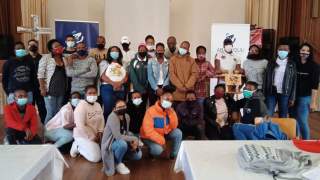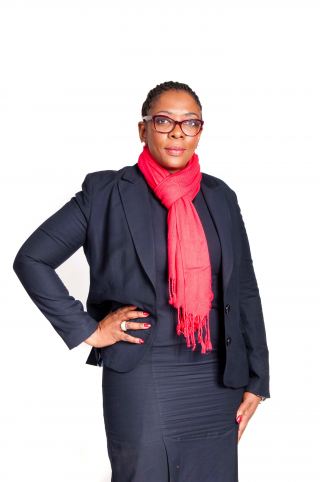4IR skills the way to financial freedom for SA youth
UNEMPLOYED YOUTH EMPOWERED WITH 4IR SKILLS TO CREATE FINANCIAL INDEPENDENCE
80 unemployed youth from Eastern and Western Cape are being given an innovative opportunity to access fourth industrial revolution opportunities, through a unique training and education intervention initiated by local NPO Abaguquli.
Abaguquli – which means transformers in Zulu – is a non-profit organisation founded on the philosophy of transforming lives through education and innovation. They offer a range of training interventions with the specific aim of enabling youth to become financially independent through freelancing work opportunities, co-operatives and small businesses that address the daily needs of life and industry in the technology era.
The learners, 40 from Elsies River Western Cape and 40 from Gqeberha Eastern Cape have participated in a 4-month programme aimed at addressing the current skills and qualifications required to earn a living or generate an income.
Students learn how to build a website to promote their personal profiles as a freelancer or micro business. They're exposed to eCommerce, apps, bots and plugins to make their websites work for them. Each student leaves with the digital marketing skills to promote their business website online as well as the ability to pitch their skills and vie for paying gigs on freelancer platforms.
At the end of the course, students will be able to:
- Build a website with Yola.com. Sites are eCommerce enabled allowing learners to sell products, chat with customers and book appointments online.
- Promote their profile and micro business on social media platforms and to sell their skills on freelancer marketplaces. “The high youth unemployment rate in South Africa, particularly unemployed graduates, means we need a different model and a different approach for young people,” says Aasiyah Adams CEO and Founder of Abaguquli.
“We need tech savvy young people that are able to start businesses and service clients around the world through remote working opportunities,” added Adams.
The Fourth Industrial Revolution (4IR) or Industry 4.0 as it is also commonly referred to, is the age of digitisation, automation, smart cities and factories. 4IR is not just about technology, but also about integration, about greater productivity and efficiency and includes advancements that have pervaded every aspect of modern life.
“Whilst the local economy doesn’t currently have the capacity to absorb unemployed youth en masse, this era of tech innovation and global economic growth, is a means for youth to unlock market opportunities beyond their geographic location to generate an income,” Adams continued.
In addition to this cohort of upcoming graduates, Abaguquli, which only started operating in 2020, has already seen over 200 learners from Western Cape and Gauteng achieve their remote pilot license (SACAA drone license). They’ve also rolled out courses in 3D printing, Laser printing, Coding and Arduino electronics as well as 3D mapping for precision agriculture.
Abaguquli is currently working on building mobile labs, fully equipped with state of the art technology, drone simulators and a humanoid, where learners can explore coding, artificial intelligence, data analysis, robotics and other 4IR skills. The objective is to drive the trucks to remote rural areas to create awareness and run mini workshops to educate young minds about future skills. Abaguquli wants to reach out to marginilised individuals and in areas where unemployment and poverty is high. Their vision is that young people could choose careers and paths that will create financial independence through E-commerce and remote working opportunities presented globally.
“I am extremely excited about this opportunity for these rural communities and am currently engaging with stakeholders in this regard,” added Adams.
This group of 80 learners will graduate on 18 June in Elsies River Western Cape and 25 June in Gqeberha Eastern Cape. “
We are so proud of these young men and women that have pushed through many hardships, misfortunes and even some physical disabilities to take the reigns of their own futures,” concluded Adams.
For more information about Abaguquli or to find out more about funding opportunities available visit www.abaguquli.co.za or contact Aasiyah Adams on 071 199 8396 or This email address is being protected from spambots. You need JavaScript enabled to view it..
Cape Town Startup MindZu in Finals of Global Edtech Awards
Cape Town startup MindZu (www.mindzu.com) has made it into the finals of the Global Edtech Startup Awards. Over 3,000 companies from more than 80 countries entered the GESAwards competition, which provides an unmatched showcase for the most innovative companies from across the world.
Godfrey Parkin, co-founder of MindZu, said, “Being selected for the finals is a huge endorsement for a company that has an ambitious mission. Through quality gamified maths education we improve the lives of millions in South Africa, and worldwide – irrespective of how dire or non-existent their school circumstances are.”
MindZu provides a full year of the highest quality maths education, via the learner’s own phone, for the price of a meal.
“The education system has failed the masses in South Africa and throughout the developing world,” says Parkin. “Most edtech operates within this failed system, so it too fails the masses.” MindZu is disrupting education by going direct to learners.
The company’s focus is on maths, particularly the final years of high school. To MindZu, learning maths is more than just being able to regurgitate Pythagoras or pass exams. “The early teenage brain is evolving faster than at any time other than the first years of life,” says Parkin. “The teen brain is ‘wiring’ itself to process complexity, and the quality of that wiring is determined by what stimulates or challenges it. Learning maths creates teenage minds which excel at creativity and complex problem-solving. It multiplies an individual's prosperity options. And as a consequence it collectively lifts the economy – not over decades but almost immediately.”
Learning maths - the most important developer of 21st century mental skills capacity in teens - should never be dumbed down in educational curricula, and the already disadvantaged should never be deprived of the upliftment benefits it brings. Yet our school system and our teachers struggle to teach the subject.
Across sub-Saharan Africa, the majority of youngsters aged 15-17 are not even in school, and this will get worse as migration levels grow. How do you get maths education to mobile, un-schooled or poorly schooled kids? The only way is to make it truly inexpensive, and deliver it via their mobile phone in a format which is compelling, exciting, and gamified. This is what MindZu does.
“We are solving not just a South African maths problem. We are solving a developing world prosperity problem. And we can do it profitably, which means we will be able to grow without depending on grants or donations,” says Parkin.
The GESAwards are a joint project of leading edtech organizations from across the world. In South Africa the awards are sponsored by the UK South Africa Tech Hub, a UK government initiative.
4th Industrial Revolution Courses in South Africa
Are you equipped for the Fourth Industrial Revolution? Do you have skills and expertise required to thrive? Discover best courses to study for the future so that you remain relevant. There are top degrees in demand for the future that you should definitely not ignore. We try our best in terms of selecting ONLY the best courses to match you with careers that will be in demand in 2025 and beyond within South African context, as well as globally.
Browse courses in the following categories:
and more
My Courses Renot provides you with great learning resources and courses which are currently on demand. IF you are a career driven individual, you would find information on this site most valuable.
Learn Digital Marketing Skills from top Institutions in Johannesburg. Browse courses
Also read: Do you also want to be a Real Estate in Johannesburg South Africa?
FP&M SETA CEO instrumental in empowering and upskilling the workforce amidst the 4IR
In a world full of design flaws subconsciously set against women, it is inspiring to have a woman advocating for the presence of other females, especially in industries weighted towards men.
As the CEO of the Fibre Processing and Manufacturing Sector Education and Training Authority (FP&M SETA), Ms Felleng Yende has the gargantuan task of managing the SETAs 13 sub-sectors’ daily operations. She further ensures each sub-sector and the collective SETA deliver on their mandate of creating an employable workforce in the advent of the fourth industrial revolution.
As a champion for transformation, Yende not only bears the responsibility with expedient efficiency but her award-winning leadership further accelerates the progress of South Africa’s biggest SETA closer to actualising the National Development’s Plan (NDP) of eradicating poverty, unemployment and inequality by 2030.
To address future and emerging skills, Yende had the vision and foresight to partner with Forestry South Africa, to develop a ‘virtual reality’ application that gives trainee chainsaw operators a chance to test the skills they have learned in the classroom in a virtual forest. The aim of developing the application is to provide training service providers with a tool that will help prepare trainees for taking that big step from the classroom to the field for the practical component of their training. The application provides trainees with an opportunity to practice with a chainsaw in their hands in a totally safe ‘virtual’ environment and allows trainers to test their competency – at relatively low cost.
Yende’s commitment to implementing skills development projects in the sector outcome of alignment to Government’s vision for the creation of decent jobs, has been one of her trademark successes. The realisation of these projects is due to her focused engagements with industry for employment-based training, thus committing employers to guarantee job placement post training.
FP&M SETA has partnered up with the National Clothing Bargaining Council with a vision of delivering over 6 000 new jobs by 2025. In light of the outcomes of the Jobs Summit of 2019, the creation of decent, quality and sustainable jobs is a Government priority and a human rights issue. Yende facilitated the Board approval of funding of approximately R11 million for the National Bargaining Council Clothing and Textiles Job Creation Project.
Another project that was successfully conceived by Yende was The Celrose Clothing 600 Job Creation Project. Celrose Clothing is a large clothing employer that manufactures branded clothing for large retailers such as Edgars, Truworths and Woolworths. This project is also aligned to the “Buy Local” and “Proudly South African” campaign. Celrose Clothing intends recruiting a further 600 unemployed youth from previously disadvantaged and designated groups during the 2019/20 financial year and the FP&M SETA Board has approved funding to the value of R5 million for the implementation of this project.
Currently, Yende’s focus is the fourth industrial revolution, focusing on new and emerging scarce and critical skills that will give the industry a competitive advantage and ensure that they become more sustainable in the medium to long term. It is Yende’s dedicated passion to promote the economic growth of FP&M industries.
“The fourth industrial revolution will bring us advanced robotics and autonomous transport, artificial intelligence and machine learning, advanced materials, biotechnology and the internet of things that will transform the way society works and lives. South Africa’s future workforce will need to align its skills set to keep pace with these developments, and this is where we have aligned the SETA’s research agenda, as it enables industry to keep abreast of the technologies and the trends that will inform our skills development initiatives of the future.”, concluded Yende.




